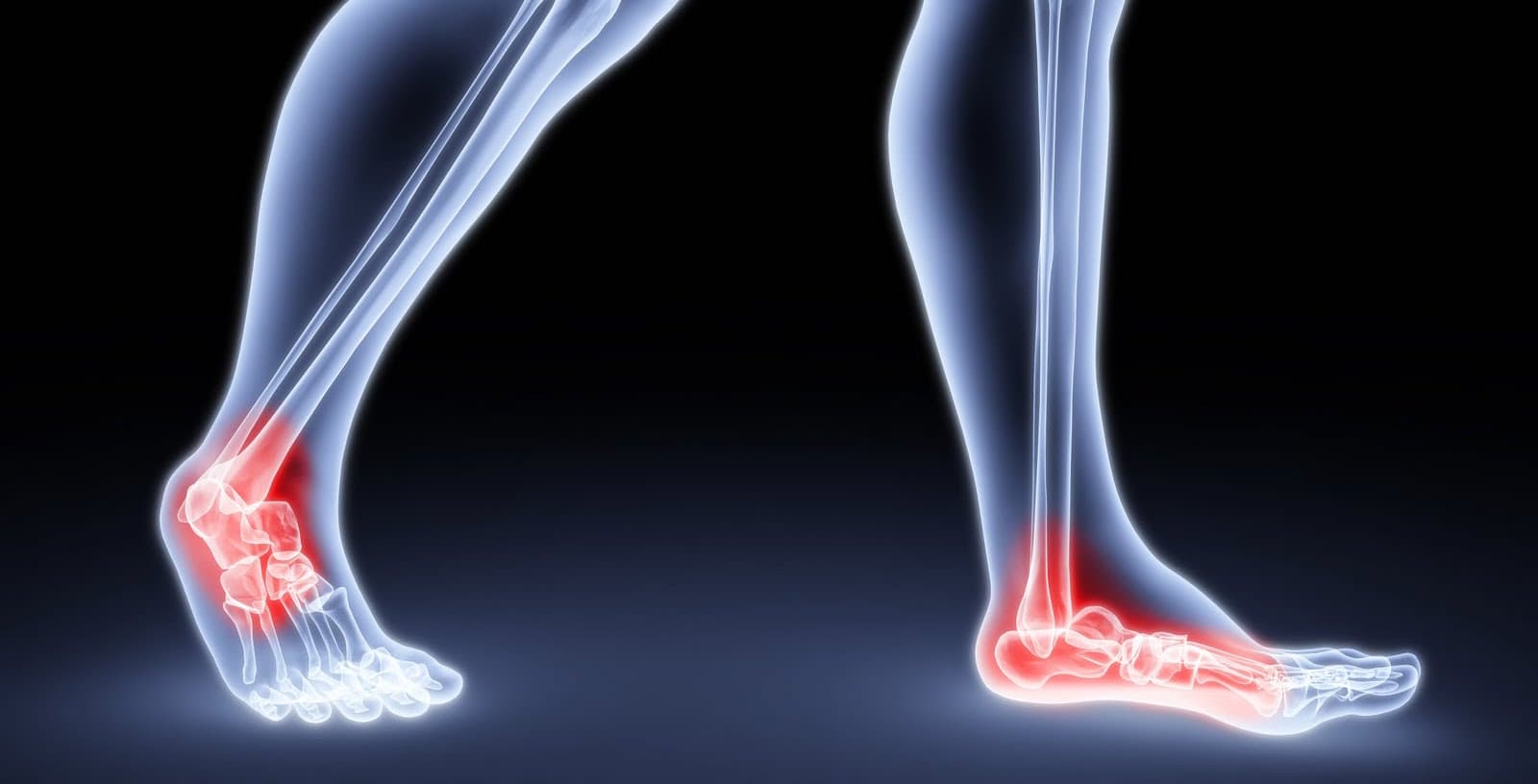Physiotherapy Approach To Psychogenic Pain: Healing the Invisible
Pain can be hard to deal with and can seriously affect your daily life. Most people think of pain as coming from physical injuries or health problems, but there’s also pain that comes from psychological factors. This type of pain is known as psychogenic pain.
Psychogenic pain is a complicated condition that makes us think about how the mind and body are connected. Even though the term “psychogenic pain” isn’t used as much anymore by healthcare providers because it can confuse people. However, the idea behind it is still vital in studying and treating pain.
In recent years, physiotherapy has gained more attention for helping people with psychogenic pain. This blog will explain how physiotherapy can be an important part of helping people deal with and overcome this type of pain.
Key Takeaways
- Psychogenic pain is real physical pain caused by mental, emotional, or behavioral factors.
- Physiotherapy adopts a holistic approach to treat both physical and psychological aspects of pain.
- Education and reassurance are crucial first steps in physiotherapy for psychogenic pain.
- Cognitive-behavioral therapy techniques are incorporated into physiotherapy treatment.
- Exercise and movement retraining help improve physical function and reduce pain sensitivity.
- Pain neuroscience education helps patients understand pain mechanisms and develop coping strategies.
- A multidisciplinary approach involving various healthcare professionals is most effective.
- Early intervention with physiotherapy can prevent chronic pain patterns and complications.
- Physiotherapy for psychogenic pain faces challenges like stigma and the need for patient engagement.
- Research supports the effectiveness of physiotherapy in managing psychogenic pain disorders.

What exactly is psychogenic pain?
Psychogenic pain, also called “nociplastic” or “psychosomatic pain,”(1) is physical pain caused by mental, emotional, or behavioural factors without a clear injury or illness. Even though there’s no noticeable physical cause, the pain is very real and can be just as hard to deal with as pain from an injury. It’s a chronic type of pain and not an acute pain, and it’s closely linked to emotions.
Psychogenic pain often manifests as headaches, back pain, muscle soreness, or stomach discomfort. It is closely tied to emotions like worry or sadness. Psychogenic pain might get worse when you’re stressed out, or you may feel better when your mood improves. The International Association for the Study of Pain (IASP) say that everyone experiences pain differently and that our pain is affected by our body, thoughts, feelings, and the surroundings.

Role of physiotherapy in treating psychogenic pain
You might wonder why physiotherapy is recommended for pain with psychological origins. The answer lies in how our minds and bodies are connected. While the pain may arise from psychological factors, it is reproduced physically and can lead to actual physical pain and limitations.
Physiotherapy can play an essential role in addressing both the physical and psychological effects of pain management. While traditional physiotherapy focuses on treating physical symptoms, the approach to psychogenic pain requires a more holistic outlook that addresses both physical and psychological aspects.
Why physiotherapy might be beneficial for psychogenic pain?
Holistic approach: Physiotherapists are increasingly adopting a biopsychosocial model of pain, which considers biological (physical), psychological, and social factors in pain management.
Improved physical function: Even if the pain originates from psychological factors, it can lead to physical limitations. Physiotherapy with a suitable treatment plan can help reduce physical pain and improve flexibility, strength, and overall physical function.
Pain education: Physiotherapists can provide valuable education about pain mechanisms, helping patients understand and manage their symptoms better.
Non-pharmacological intervention: Physiotherapy offers a drug-free approach to pain management, which can be particularly beneficial for those concerned about medication side effects or dependency.
Complementary to other treatments: Physiotherapy can complement other interventions like counselling, psychotherapy, or medication, providing a broad treatment approach.
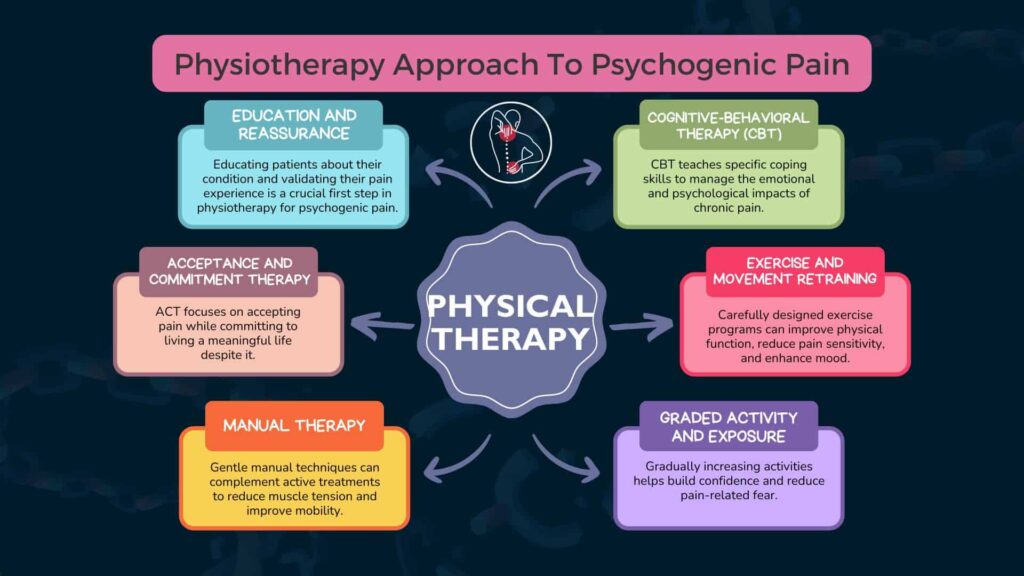
Physiotherapy approach to psychogenic pain
When it comes to managing psychogenic pain, physiotherapists employ a variety of techniques and strategies.
Education and reassurance
One of the first steps in physiotherapy for psychogenic pain is educating the patient about their condition. Physical therapists help patients understand that their pain is real and valid, even if it doesn’t have a clear physical cause. This validation and education can empower patients who may have felt dismissed or misunderstood.
Cognitive-behavioral therapy (CBT)
CBT teaches patients specific coping skills to deal with the emotional and psychological impacts of their chronic pain. These skills may include
- Relaxation techniques: Deep breathing and progressive muscle relaxation to reduce muscle tension and stress.
- Activity pacing: Breaking tasks into smaller, manageable parts to avoid pain flare-ups.
- Thought challenging: Identifying and changing negative thoughts like “I’ll never get better” to more realistic ones.
- Goal-setting: Setting achievable goals for increasing daily activities and exercise.
Acceptance and commitment therapy (ACT)
The principle of ACT focuses on accepting pain while committing to living a meaningful life despite it. Physiotherapists can incorporate ACT principles by:
- Encouraging acceptance of current limitations while working towards improvement.
- Helping patients identify valued activities and find ways to engage in them despite pain.
- Teaching mindfulness techniques to help increase pain acceptance and reduce its impact on daily life.
Exercise and movement retraining
Carefully designed exercise programs can help improve physical function, reduce pain sensitivity, and improve mood. These might include
- Motor control exercises: Focusing on retraining specific muscle groups to improve movement patterns. These exercises can include gentle stretching exercises, strength training, and low-impact aerobic activities.
- Proprioceptive training: Enhancing body awareness and control through targeted exercises. This can include balance and coordination exercises.
- Functional task practice: Practicing everyday movements and tasks to improve confidence and reduce fear of movement.
Manual therapy
While the primary focus is active treatments, gentle manual therapy can be beneficial. This can include:
- Soft tissue mobilization: To reduce muscle tension and improve circulation.
- Joint mobilization: To improve range of motion and reduce stiffness.
- Myofascial release: To address fascial restrictions that may contribute to pain.
Pain neuroscience education
Educating patients about pain mechanisms can significantly impact pain management. This helps patients understand how the brain processes pain and how psychological factors can influence pain perception.
- Explaining the difference between acute and chronic pain.
- Discussing the role of the nervous system in pain perception.
- Addressing misconceptions about pain and tissue damage.
- Help patients shift their focus away from pain sensations and develop better coping strategies.
Relaxation techniques
Physiotherapists may teach relaxation methods such as deep breathing exercises, progressive muscle relaxation, or mindfulness techniques to help manage stress and reduce pain sensitivity.
Graded activity and exposure
For patients who have developed fear or avoidance of certain movements, physiotherapists can guide them through gradually increasing and returning to these activities to build confidence and reduce pain-related fear. Patients are taught strategies to manage their symptoms independently.
Importance of a multidisciplinary approach
While physiotherapy is important in managing psychogenic pain, it’s most effective when it is part of a multidisciplinary approach. Collaboration with psychologists, pain specialists, and other healthcare professionals ensures comprehensive care addressing all aspects of the patient’s condition.
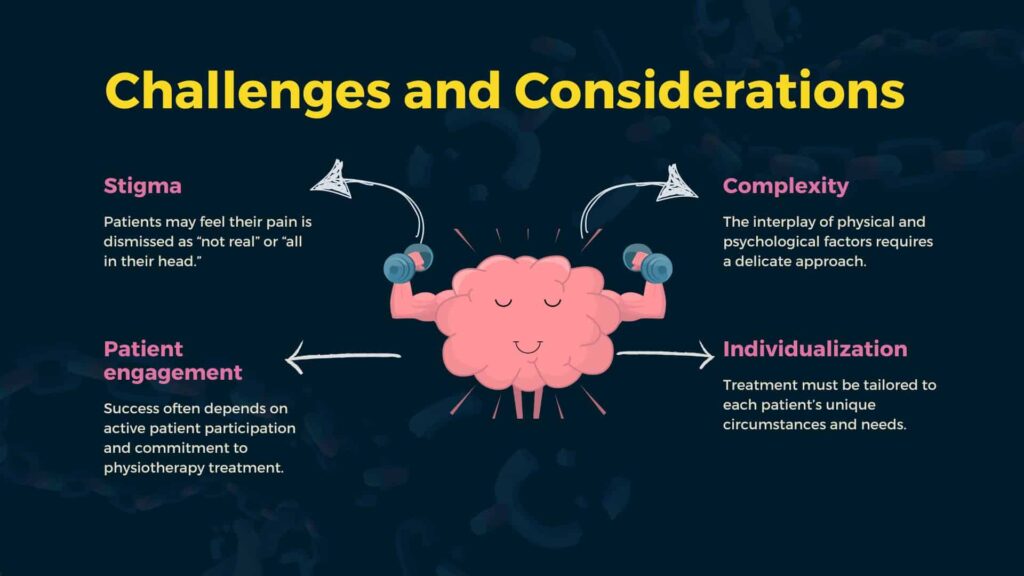
Challenges and considerations with physiotherapy treatment for psychogenic pain
Treating psychogenic pain presents unique challenges:
- Stigma: Patients may feel their pain is dismissed as “not real” or “all in their head.”
- Complexity: The interplay of physical and psychological factors requires a delicate approach.
- Patient engagement: Success often depends on active patient participation and commitment to physiotherapy treatment.
- Individualization: Treatment must be tailored to each patient’s unique circumstances and needs.
Evidence for physiotherapy in psychogenic pain
Research on physiotherapy for psychogenic pain is still evolving, but evidence suggests its effectiveness(NCBI):
- A consensus recommendation by physiatrists, neurologists, and neuropsychiatrists emphasizes the importance of physiotherapy in treating functional motor disorders, which often overlap with psychogenic pain.
- Studies have shown that biopsychosocial-based physiotherapy approaches can significantly improve pain management and functional outcomes in chronic pain conditions.
- Acceptance and commitment therapy (ACT) principles incorporated into physiotherapy have demonstrated effectiveness in reducing pain-related distress and improving quality of life.
Best time to seek physiotherapy for psychogenic pain
The best time to seek physiotherapy for this pain is as soon as you recognize that pain is greatly impacting your daily life and well-being. Early intervention can help prevent the development of chronic pain patterns and associated complications. You should consider seeking physiotherapy if:
- Your pain persists despite other treatments
- You’re experiencing limitations in your daily activities due to pain
- You’ve been diagnosed with a psychological condition that may be contributing to your pain
- You want to explore non-pharmacological options for pain management
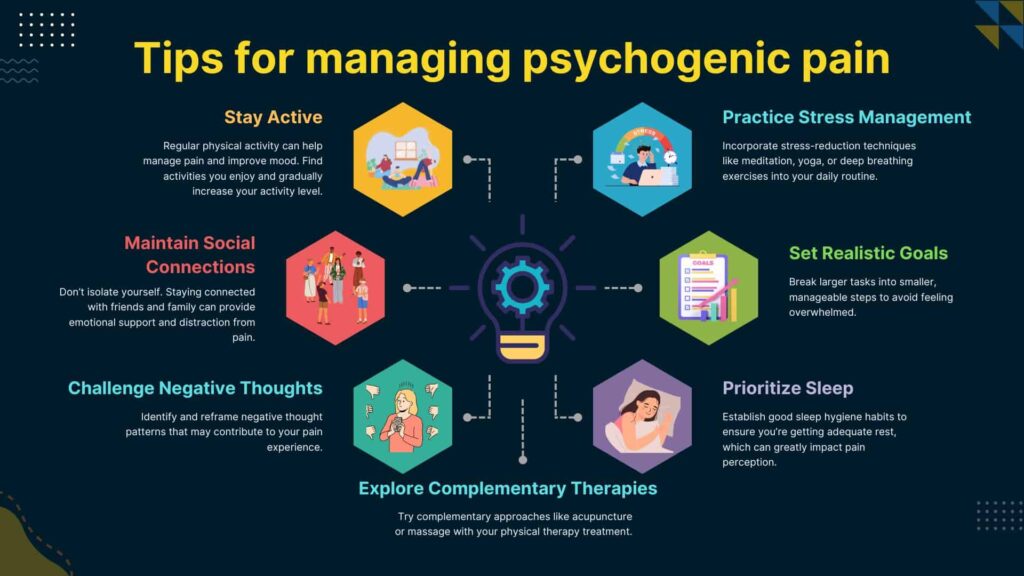
Tips for managing psychogenic pain
- Stay active: Regular physical activity can help manage pain and improve mood. Find activities you enjoy and gradually increase your activity level.
- Practice stress management: Incorporate stress-reduction techniques like meditation, yoga, or deep breathing exercises into your daily routine.
- Maintain social connections: Don’t isolate yourself. Staying connected with friends and family can provide emotional support and distraction from pain.
- Set realistic goals: Break larger tasks into smaller, manageable steps to avoid feeling overwhelmed.
- Challenge negative thoughts: Identify and reframe negative thought patterns that may contribute to your pain experience.
- Prioritize sleep: Establish good sleep hygiene habits to ensure you’re getting adequate rest, which can greatly impact pain perception.
- Explore complementary therapies: Try complementary approaches like acupuncture or massage with your physical therapy treatment.
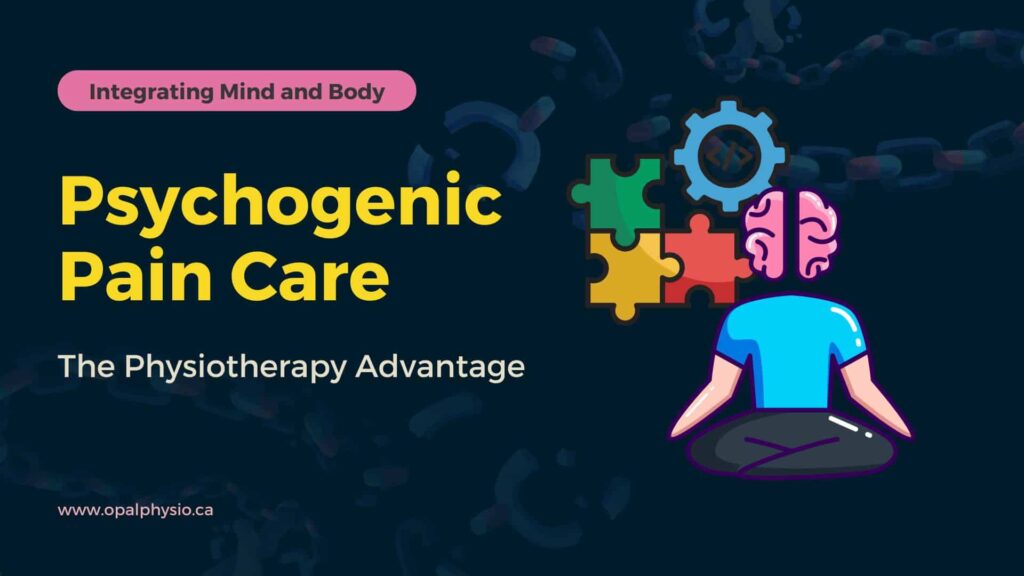
Integrating Mind and Body: The Physiotherapy Advantage in Psychogenic Pain Care
Physiotherapy plays an integral role in the management of psychogenic pain disorders. It offers a unique blend of physical interventions and psychologically informed approaches. By addressing both the physical pain and the psychological factors that influence pain perception, physiotherapists can help patients break the cycle of chronic pain, improve their functional capacity and develop effective coping strategies.
The field continues to evolve, with new techniques and technologies offering promising avenues for effective treatment. As our understanding of pain neuroscience advances, so too will the strategies employed by physiotherapists in managing psychogenic pain.
Ultimately, the most effective approach to psychogenic pain is the one that recognizes its complexity, respects the patient’s experience, and employs a diverse range of evidence-based interventions tailored to the individual’s needs. Physiotherapy, as part of a multidisciplinary approach, is well-positioned to make a significant positive impact on the lives of those living with psychogenic pain.

Cynthia Pathipati – Registered Physiotherapist
Cynthia Pathipati completed her bachelor’s in physiotherapy and is a qualified Registered Physiotherapist in good standing with the College of Physiotherapists of BC with more than 15 yrs of experience. She has Post-Graduate Credentials and Certifications as well as extensive knowledge experience in treating pelvic floor, orthopedic, neurological, vestibular and pain conditions.



